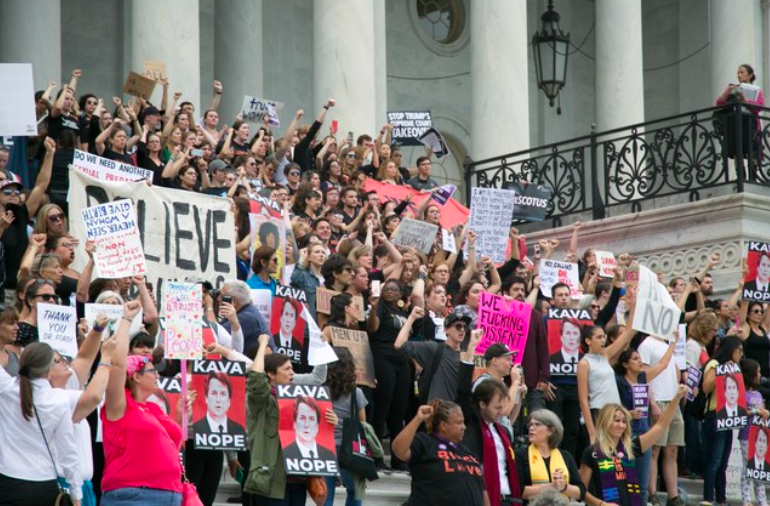 aNewDomain — Innocent until proven guilty. Senate Majority Leader Mitch McConnell floated a lot of arguments to defend Brett Kavanaugh, but that’s the one that carried the day: “We owe it to the American people,” he said, to underscore that you’re innocent until proven guilty.”
aNewDomain — Innocent until proven guilty. Senate Majority Leader Mitch McConnell floated a lot of arguments to defend Brett Kavanaugh, but that’s the one that carried the day: “We owe it to the American people,” he said, to underscore that you’re innocent until proven guilty.”
The Kavanaugh confirmation battle was a grenade wrapped in an onion covered with more poisonous sexual politics than The World According to Garp.
Yet in the end, it was simple.
Presumption of innocence was the argument that SWINO (SWing vote In Name Only) Senator Susan Collins used to justify treason to her gender.
“This is not a criminal trial, and I do not believe that claims such as these need to be proved beyond a reasonable doubt,” Collins said, announcing her crucial support for the controversial Supreme Court nominee. “Nevertheless, fairness would dictate that the claims at least should meet a threshold of more likely than not as our standard.”
Once again Democrats asked themselves: What the hell happened? And: Why did we lose a fight we should have won?
Trump’s defeat of Clinton, Bush v. Gore, the 1940 Fall of France — those were perfect storms with numerous contributing factors. Not this one. Kavanaugh made it to the Supreme Court because his allies framed #MeToo as an out-of-control mob of man-haters.
Remember when Dr. Christine Blasey Ford’s accusation that Kavanaugh tried to rape her in high school first hit the news? Republicans were on their heels at first. Polls showed that a plurality of voters didn’t want him confirmed, the worst showing of any high court nominee since they began asking the question.
Then came the one-two punch: Yale classmate Deborah Ramirez said Kavanaugh exposed himself and tried to force her to give him oral sex. Even with a Republican Senate, Kavanaugh was in real trouble.
Anti-Kavanaugh sentiment peaked after the marathon nine-hour hearing in which Ford and Judge Kavanaugh testified about her allegations. A PBS/NPR/Marist poll found that 45 percent of Americans believed her.
Only 33 percent believed him. If that’s where things had remained nine days later when the Senate voted, Collins and other wobbly GOP senators might have voted Nay.
But #MeToo came to their rescue.
Nothing unites a party like a common enemy. That goes double when the adversary allows itself to be framed as scary and unreasonable.
As the Kavanaugh vote drew nearer #MeToo activists became increasingly aggressive. They chased senators down hallways, cornered them in elevators, doxxed them and picketed their homes. Ted Cruz was confronted at a restaurant. “We Believe Survivors!” activists shouted as he fled.
Direct tactics hold politicians accountable for their sins. Confronting right-wing senators, none of whom gave a damn about the possibility that they were about to put an attempted rapist on the Supreme Court, going after them one-on-one was empowering for victims of rape and sexual assault and the millions of victims they represented. It was more than fair; it was justified.
But it didn’t turn out to be smart.
The optics and audio of all that yelling were ugly, particularly to Republican-leaning voters. Shouting incoherently — you couldn’t hear what they were saying on TV — during hearings looked rude and hostile. Screaming at elderly senators as they ran down capitol corridors exuded chaos.
They shouted and carried signs bearing the mottos of #MeToo:
Believe survivors.
Believe women.
Such powerful words. Also sloppy. “We are worried as mobs chant, ‘We believe survivors!’ (What if Ford is not truly a ‘survivor’? Don’t we have to establish whether she’s a survivor first?),” Stephanie Gutmann, a Republican, wrote in USA Today.
#MeToo is a kind of revolution. Because revolutions follow years of resentment piled upon eons of abuse, their imperative to destroy what’s broken and evil necessarily leads to intemperance. Nowhere is the revolutionary impulse toward careless imprecision more evident than in rhetoric. So it is with #MeToo — what began with an uprising no reasonable person could oppose, against bonafide monsters like Harvey Weinstein, inevitably cast its net wider into the gray area of Aziz Ansari.
As the targets of #MeToo expanded from the undeniably disgusting to garden-variety piggishness, the slogans of the movement became more militant, more thoughtless, further out on a limb.
Official policy at HR and the local PD had always been “ignore women.” A rational corrective to “ignore women” would be “listen to women.” Accusers deserve respect, to be taken seriously. So do the accused. But revolutions don’t reform the old order. They destroy it.
“Believe women” doesn’t make sense to a society whose core judicial fiction is the presumption of innocence. In America, no one, neither men nor women, neither accusers nor the accused, earns the right to be believed by virtue of their gender.
Being believed is a zero-sum right, one that inherently comes at the expense of another person and so must be earned by a combination of corroborating evidence, witnesses and the intangible social currency of credibility.
Sensing that #MeToo had overreached, yelling too loudly and deploying slogans that reeked of overcorrection, McConnell and his fellow Republican leaders rallied their party’s base in two steps.
A Supreme Court confirmation hearing usually feels like a job interview. Despite Susan Collins’ denials, the Republicans did everything they could to frame Kavanaugh’s as a trial instead, complete with a hired-gun prosecutor from Arizona to provide a veneer of legalishness.
After they’d made the spectacle look and feel like a trial it was easy to convince fence-sitting moderate Republican viewers that to be denied his seat Dr. Ford and her Democratic allies would have to follow the familiar rules of a criminal proceeding: establishing guilt beyond a reasonable doubt, adhering to sharing of evidence (which is why they attacked Dianne Feinstein for withholding Ford’s letter), the burden of proof on her, not him.
Of course, the fix was in. Ford was the one really on trial; she fended off the questions of the rent-a-DA whereas Kavanaugh didn’t have to. It was all so clever. Once Democrats allowed Republicans to set the bar at beyond-a-reasonable-doubt guilt — something the he-said-she-said nature of the 36-year-old allegation made impossible — Kavanaugh was in like Flynn.
Shaunna Thomas of the women’s group UltraViolet Action, said: “This doesn’t end [on Saturday],” she said. “It ends in November.” But not, perhaps, the way she would like. Polls show that Republicans are so energized by their win on Kavanaugh that the Dems’ chance of recapturing the Senate are dropping in part because they’re buying the argument that the #MeToo movement is dangerous.
“It’s a very scary time for young men in America when you can be guilty of something you may not be guilty of,” President Trump said in his memorably illiterate way.
Fair or not, right or wrong, the perception of many men is that #MeToo is willing to sacrifice 100 innocent men in order to end the career of one guilty one. In the same way that the civil rights movement needed white allies in order to succeed, #MeToo needs men not to fear them but to support them.
Whatever happens in the midterm elections, the #MeToo movement has arrived at a tactical crossroads. Should we #BelieveWomen?
Or should we just listen to anybody and believe everyone?
For aNewDomain, I’m Ted Rall.
Cover image: Glamour.com, All Rights Reserved.













